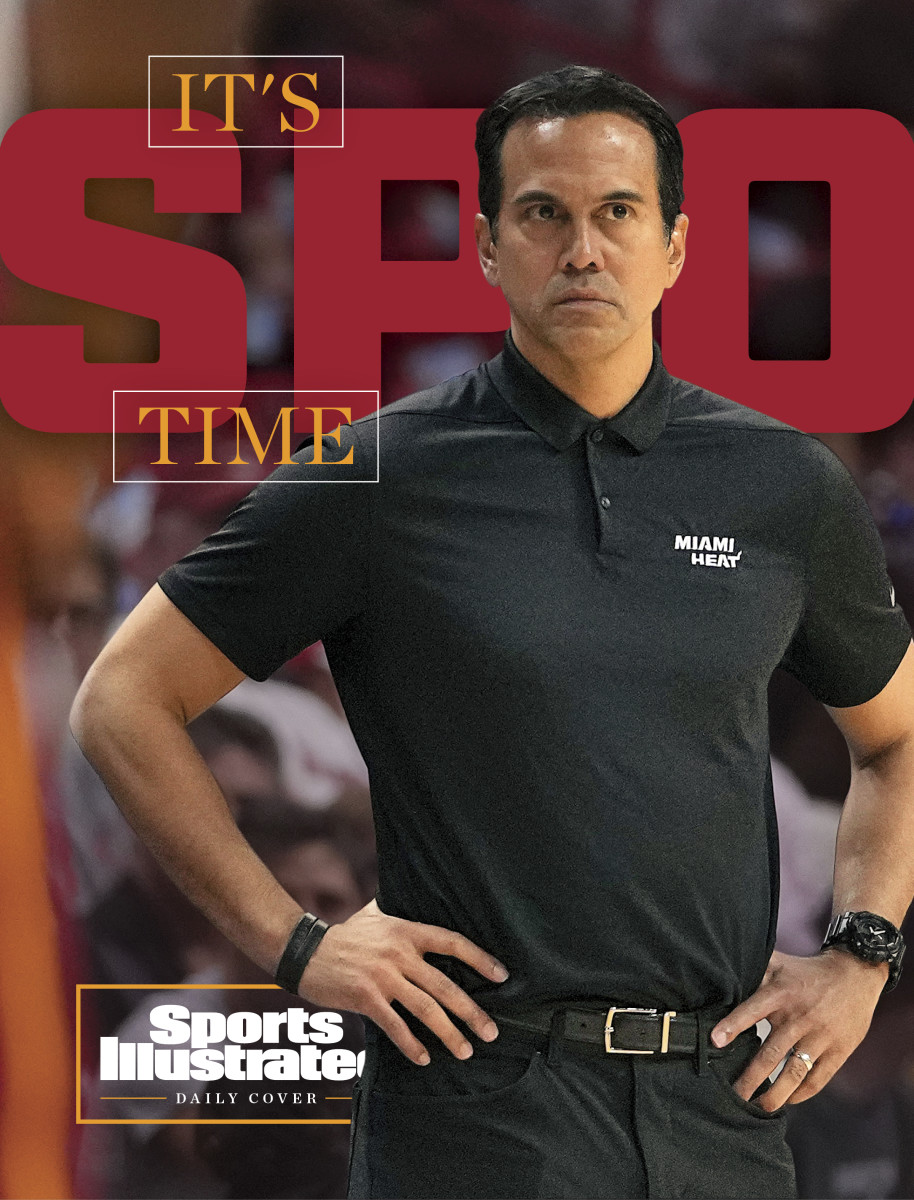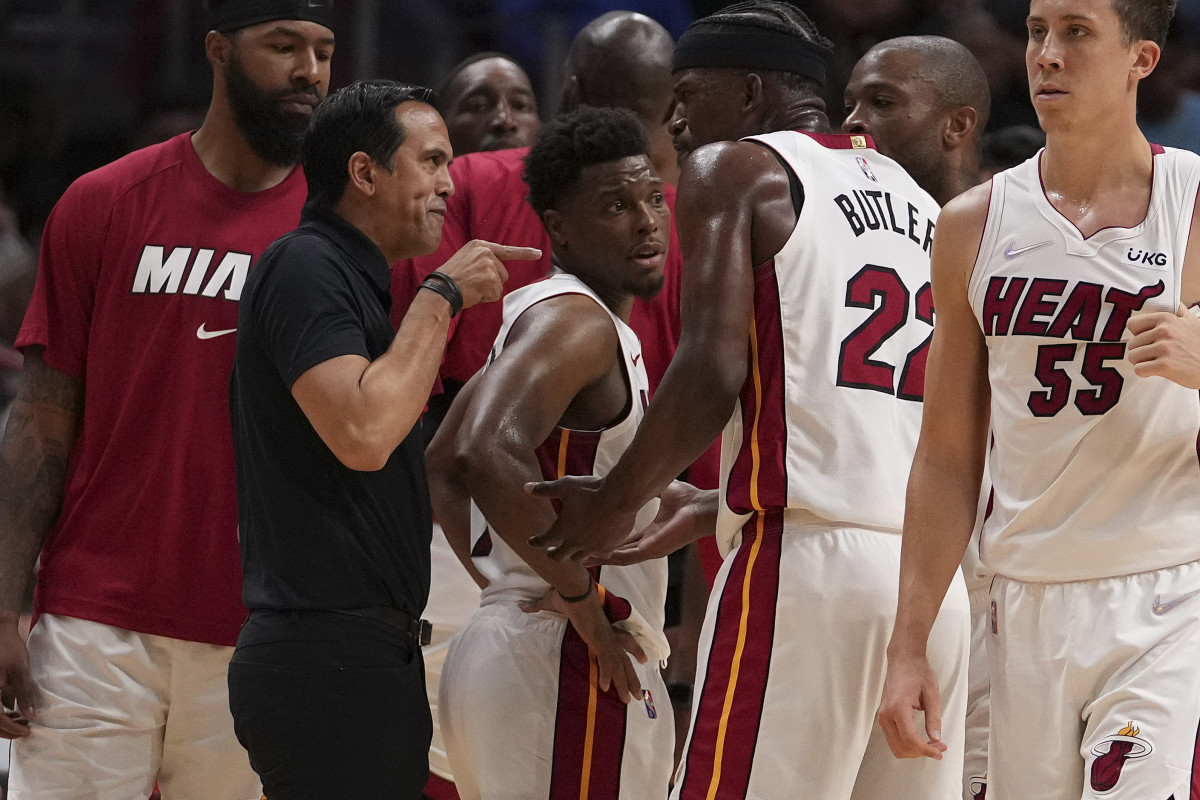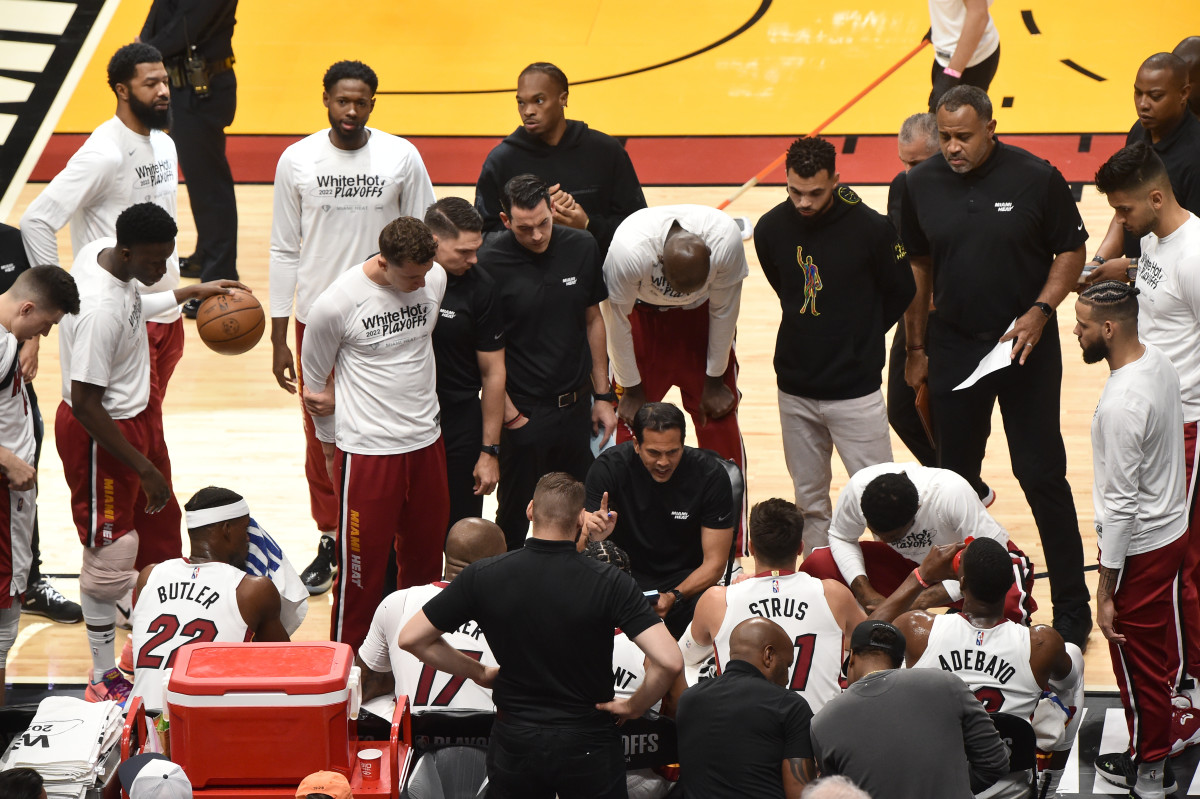‘All In, All the Time’: Erik Spoelstra Lives For These Moments

“It’s been a long time coming.” Those were the first words Heat coach Erik Spoelstra said to P.J. Tucker last August, after signing him to a two-year, $15 million contract. “We’ve been trying to get you over here for six or seven years.”
Coming off a championship run with the Bucks, Tucker nodded. He knew his no-nonsense nature would fit well with Spoelstra’s unwavering commitment to competition. But it took a little while before he realized just how singular his new coach was.
A grizzled 37-year-old veteran who’d spent more than 15 seasons on four NBA teams and several clubs across Europe, Tucker thought he’d seen everything. Then, in his first few days with the Heat, Spoelstra instructed Tucker to help off the strongside corner, disregarding a cardinal rule that NBA defenses tend to follow. Normally, a rotation would come from the opposite block. But Spoelstra wanted Tucker to protect the paint and the perimeter. “At the beginning I was like, ‘What? We’re doing what?’” he laughs. A corner three specialist himself, suddenly it dawned on Tucker why he’d had so many good games against the Heat. “You still don’t want to give up the corner three but you gotta help? I’d never seen that before. But I’ve learned to adjust and actually like it.”
This one example of Spoelstra’s inclination to go against the grain is a speck of sand on the beach of reasons why he’s the sport’s best coach. The league is filled with brilliant basketball minds. Few craft gameplans that look like Spoelstra’s, which are sharpened over 48 minutes with constant adjustments and counters. He’s bold, innovative and, after 14 years sitting in the same seat, humbled by a demanding job that requires constant improvement.

“I think he lives for those moments,” Udonis Haslem says. “To get in the trenches, and things are going crazy and you just quiet the storm. I think those are the moments that he relishes in. He feels probably the most alive. That’s when it’s fun again, you know what I’m saying?”
Now down 3–2 against the Celtics in his sixth Eastern Conference finals—and undefeated in the previous five—Spoelstra can’t raise Miami’s three-point percentage or wave a magic wand and repair Kyle Lowry’s hamstring. Sometimes even the shrewdest schemes and in-game strategic tweaks aren’t enough. He sits at the helm of an impaired Heat roster that up until now has conquered any and every setback (whether random or self-induced) in their way. On the other side is a Celtics defense that presents one of the most overwhelming challenges of Spoelstra’s tenure, holding Miami to 82 and 80 points in Games 4 and 5, respectively.
Still, despite being overmatched in several ways, the Heat can’t ever be dismissed because they’ve assumed their coach’s plucky resolve. “That’s one thing that really stands out with him,” Boston coach Ime Udoka said before Game 1. “A guy that has learned on the fly, but also keeps you off balance, keeps you guessing and has kind of adapted throughout the years to where he’s at now.”
After Miami’s dramatic, gritty Game 3 win, Spoelstra called Bam Adebayo the Heat’s heart and soul. But in a league that’s driven by star talent and defined by roster turnover, Spo is their brain, a grounding, measured presence and cultural tonesetter, the cultivator of an environment that squeezes the most out of every roster he’s given, regardless of who’s healthy, injured, content or unhappy. The scoreboard may not come up in Miami’s favor on Friday night, but Spoelstra won’t let the Heat go out dumbfounded or overpowered. It’s a testament to all the qualities that make him exceptional.
“I think he’s probably the most complete coach in this league,” Haslem says. “When you talk about X’s and O’s … he just sees the game from a bird’s-eye view and he leaves no stone unturned. When you talk about relationships with his players and his staff. When you talk about player development, what they were when they got here, who they become while they are here. And you just talk about the overall compassion of saying, ‘When you step into this locker room you become a part of his culture and his family’ … you can get guys to trust you and buy into what you’re preaching and believing.
“I think Spo has mastered all those things.”
His ability to balance stubbornness with flexibility helped Miami float over a complicated season. Spoelstra understands when change is necessary and, emboldened by an employer that prioritizes winning, is trusted to push buttons when others might be stagnant. Not every coach could or would purge a $90 million three-point marksman from his rotation in the middle of the postseason, as Spoelstra did to Heat guard Duncan Robinson before injuries elsewhere drew him back.
“It’s part of trying to win, finding solutions, not getting caught up in your own dilemmas, but instead just buying into what's best,” Robinson says. “You gotta have a trust that he has that vision and insight for what's best for the team. … I definitely feel like he's a competitive advantage relative to our counterparts. It’s kind of like a weapon in our arsenal.”
Whether Miami wins the title or falls short, the 2021–22 season can and should be regarded as the most impressive campaign of Spoelstra’s Hall of Fame career. During a year where he was named one of the 15 greatest coaches in NBA history, the 51-year-old maestro piloted the Heat at the peak of his powers, showcasing all the different ways he, as a coach, has established himself as the face of a franchise that’s a decade removed from being ground zero for the player empowerment era.

The Heat won 53 games and finished with the No. 1 seed despite chaotic circumstances, numerous injuries and the strains any team trying to assimilate new skill sets and different egos from one year to the next is forced to experience throughout a six-month regular season.
The need to evolve started in the preseason. In addition to bringing in Tucker, the Heat also traded for Lowry, a traditional point guard whose on-court fit was less complicated than unfamiliar. “Goran [Dragić] and Kyle play very differently,” Robinson says. “We ran a lot of stuff through Bam without Kyle but now that Kyle’s here, that kind of shifts offensive philosophy and where the ball should go.”
On Dec. 1, the Heat announced that Adebayo would undergo thumb surgery. Miami responded by going 10-5 in December and Spoelstra was named the Eastern Conference Coach of the Month. Adebayo missed all 15 of those games. Jimmy Butler missed 11 of them (and 25 total during the season). On Dec. 23, Dewayne Dedmon (Adebayo’s backup) sprained his MCL. The Heat then went 7–3 with rookie Omer Yurtseven starting at the five.
More injuries were commonplace. Lowry missed 19 games. Markieff Morris and Victor Oladipo combined to appear in 25 games. (Butler, Lowry, Tucker, Adebayo and Tyler Herro have shared the court for only 54 minutes this season—just three of them in the playoffs.)
When asked about the challenges he’s had to endure this season, Spoelstra sees the obstacles as nourishment. “I thought this season was very fruitful in terms of growth for all of us. The bottom line is winning, but you also want to grow in this profession and be pushed and pulled in a bunch of different directions to see how you can become better from adversity,” he said. “And it was about as memorable and eventful as a regular season as you can have.”
Spoelstra’s even-keel demeanor helped limit minor brush fires from raging into uncontrollable infernos. Against the Warriors on March 23, Spoelstra, Butler and Haslem had to be separated during a timeout. A clipboard was thrown. Physical threats were made. From the outside looking in, their season was on the verge of melting down. Instead, thanks to the bonds Spoelstra forged in his locker room, Miami won six of its last seven games, held onto first place and reached its second conference finals in three years.

Haslem has worked beside Spoelstra for more than 20 years. What he’s noticed from his coach is a growth from someone solely focused on teaching the game and communicating what he sees on film, to someone who’ll strive to personally connect with everyone on his team.
“I think that’s something he’s really taken to heart,” Haslem says. “Not looking at the guys just like players but also looking at them as, you know, friends. When we come to work in here, we understand who the boss is, but it’s a very friendly, brotherhood-like atmosphere. When I say ‘friendly brotherhood,’ brothers fight. You know what I’m saying? But that’s what we walk into every time we walk in here. A brotherhood.”
Spoelstra is present and mindful, balancing the truculence that Pat Riley bled into the organization with a more approachable tack. Heat wing Caleb Martin wasn’t sure what to expect when he signed with Miami in September. He heard the Heat were militant, which, coming from Oak Hill Academy, is something Martin was used to. Spoelstra startled him, though. They talk, laugh and joke during team breakfasts, dinners and film sessions.
“I just think it took me by surprise at how, not laid back, but, like … I guess kind of laid back,” Martin says with a smile. “Obviously, when it’s time to do business, it’s time to do business. But he does a great job of mixing it so it doesn’t feel like you’re at your job all the time.”
While making more of an effort to relate with his players, Spoelstra is also intentional with his words. He repeats the same maxims over and over and over again, morsels of inspiration that serve their own purpose. The one that first springs to Haslem’s mind is Enjoy others’ success.
“Very few players in this league have the exact role that they want. Everybody wants that superstar role; very few people are going to get that superstar role,” Haslem says. “What you have to do is, you have to be a superstar in whatever role you were given. And whatever role you were given you had to maximize that opportunity and not be hating on the superstars or be mad. We celebrate the success of everybody on this team, and that’s something that Coach Spo preaches from Day 1.”
Every player interviewed for this story has one at the forefront of their mind. “10x is a big one,” Robinson says. “10x communication, multiplied across all of us. … Since I’ve been here I’ve gone through different waves of different Spo-isms, for sure.”
Adebayo’s favorite is Leadership at all levels. “I feel like that's one of the biggest Spo-isms that resonates with me,” he says. “It just shows he wants everybody to be a part of it. It doesn’t matter if you don’t play or you’re a starter or you’re a role player. It doesn’t matter. Everybody has a voice. And I feel like that's the best thing for a team, when everybody can speak.”
Tucker has another. “He’s always talking about guys glitching,” he says before a brief impersonation. “‘You can’t glitch out! No glitching out! There are no glitch out moments in this series! We don’t have time for glitches.’ He hates glitches, man. Do not glitch out.”
Spoelstra’s uniform throughout the conference finals has been the same, minus a steady rotation of Jordan III colorways. It’s a Steve Jobs–ian way to reduce decision fatigue, though Spo’s getup is a bit more comfortable: black Nike basketball shorts under a tight charcoal Miami Heat hoodie, with glasses tucked into the neck over a gold necklace. In the muck of a playoff run that would yield his third ring at the helm, Spoelstra isn’t bothered by the mundane.
That includes honors outside what his team is trying to accomplish. Those close to him insist he doesn’t care about Coach of the Year, an award he’s never won. The players who are willing to run through a brick wall for him, though, are a little less understanding.

“No knock on Monty Williams. I love Monty. Great guy. Love what they’ve been able to do in Phoenix. I love James Jones. But if it was my pick I would’ve picked Spo,” Haslem says before getting asked for his reaction to Spoelstra never winning the award. “I’m surprised and disappointed. But I also understand that a lot of people focus on a lot of things that are considered sexy. Our coach is not sexy.
“We don’t have a lot of foolishness. We don’t have guys that average 89 points. We don’t have all that. We really got eight undrafted guys that come in here every day and don’t worry about what people got to say on the outside. We like-minded as hell, and we hungry. And that’s all we worry about. We don’t get the credit. Jimmy doesn’t get the credit. Spo doesn’t get the credit. But the crazy thing about it is we don’t give a f---. We just want the ring. We don’t want the credit.”
Adebayo can’t wrap his mind around how most will acknowledge who the league’s best coach is, then not reward him in an official capacity. “That’s the question I never understand,” he says. “People in the league ask how great of a coach he is, what he does and how he does it, and then he doesn’t win Coach of the Year. And 60% of his team is undrafted!”
Ultimately, when discussing a coach at the top of his profession with no end to his remarkable run in sight, individual awards are footnote detours away from appreciating what makes him stand out. Next year, Spoelstra’s tenure with one organization will be surpassed by only the following coaches: Red Auerbach, Jerry Sloan and Gregg Popovich. The staying power, in an age where even a championship isn’t enough to guarantee job security, let alone respect, is mind blowing. (Think about this: Right now only 10 teams have the same coach they had at the start of the 2019–20 season.)
“Being genuine is an all-inclusive trait that a lot of people don’t have,” Popovich said in February. “[They] play a role or think they have to act a certain way or believe they have to put on a show for somebody. Spo is the real deal. Just a genuine, good human being who works his ass off. He connects with people. … Knowing basketball and being able to teach basketball, that goes without saying.”
Close friends refer to Spoelstra as a life-long learner, someone who asks more questions in casual conversation than he cares to answer. “[The Heat are] successful because of his strong beliefs and his will about the way they do things,” says George Washington head coach Chris Caputo, who developed a close relationship with Spoelstra while working at the University of Miami. “And yet sometimes I think when people are like that, they’re very dismissive of other ways of doing things. What makes him special is his curious mind.”
Also, his passion. In all his years knowing Spoelstra, Caputo still can’t shake one particular memory.
In 2013, not even 24 hours after he lifted the Larry O’Brien trophy over his head at AmericanAirlines Arena for the second time, Spoelstra drove over to Jim Larranaga’s Basketball Camp. It was a Friday afternoon, around 2 p.m., and Spoelstra’s nephew was about to play his last game before the closing award ceremony.
“In some ways, I know he's there for his nephew,” Caputo remembers. “In other ways, it's like, the guy loves to be in the gym, you know?”
There are many people inside the Heat organization who deserve credit for the team’s remarkable consistency—from the scouts identifying overlooked prospects (Robinson, Max Strus, Gabe Vincent, etc.) who can be simpatico with Miami’s culture, to the players who excel in the roles they’ve been asked to fill—but Spoelstra is the one who keeps it all together. He could retire tomorrow forever remembered as an adaptable legend. But even knowing this, he’s as involved and obsessed as he was when this journey started.
“I think Spo, like, really lives it,” Tucker said. “Like he lives and breathes every day, every moment. This. You can tell from private conversations, he sees everything and he’s always thinking about the next step and how to get better. I think that’s just him being all in, all the time.”
More SI Daily Covers:
• The Warriors’ Daring Quest to Extend Dynasty Run
• Joel Embiid: ‘I Thought I’d Really Lose It’
• Does the NBA Have a Profanity Problem?
